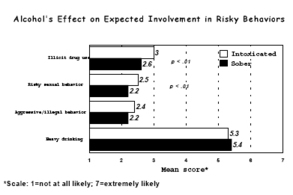Alcohol intoxication can lead to a number of changes in perception and behavior. For example, intoxicated individuals are more likely to use illicit drugs, engage in unprotected sex, or drive at dangerous speeds than sober people. Recently, researchers conducted controlled experiments to determine whether alcohol intoxication influences outcome expectancies. Outcome expectancies are beliefs about the potential positive and negative consequences of specific behavior. For example, if someone believes that heavy drinking leads to negative consequences (e.g., getting sick), that outcome expectancy may influence that person’s level of drinking. Or, when someone is intoxicated, that person might believe the negative consequences of drinking are less likely compared to their perception when they are sober. The first experiment tested the hypothesis that participants would rate negative consequences as less likely and their expected involvement in risky activities as more likely when intoxicated than when sober. Study participants (n=107) who did not have alcohol dependence symptoms and were not pregnant were randomly assigned to receive alcohol (to reach 0.10 mg% BAC) or no alcohol. Respondents reported the positive and negative consequences of risky behaviors (illicit drug use, risky sexual activities, aggressive & illegal activities, and heavy drinking), and the likelihood that positive and negative consequences would result from future participation in these risky behaviors. The results indicate that these individuals (mean age=22), when intoxicated, perceived negative consequences from illicit drug use, risky sexual behaviors, and aggressive behaviors as less likely than when sober. In addition, participants perceived a greater likelihood of future (next 6 months) illicit drug use and participation in risky sexual behaviors when intoxicated compared to when sober. Although these researchers offer alternative explanations, they suggest that alcohol influences purposeful, conscious information processing more than automatic, effortless information processing. Future research can examine whether intoxication also leads to risky gambling activity, and whether risky gambling activity also increases the likelihood of engaging in other risky behaviors–including drinking to intoxication.
Source: Fromme, K., Katz, E., & D’Amico, E. (1997). Effects of alcohol intoxication on the perceived consequences of risk taking. Experimental and Clinical Psychopharmacology, 5(1), 14-23. .
This public education project is funded, in part, by The Andrews Foundation.
This fax may be copied without permission. Please cite The WAGER as the source.
For more information contact the Massachusetts Council on Compulsive Gambling,
190 High Street, Suite 6, Boston, MA 02110, U.S.





